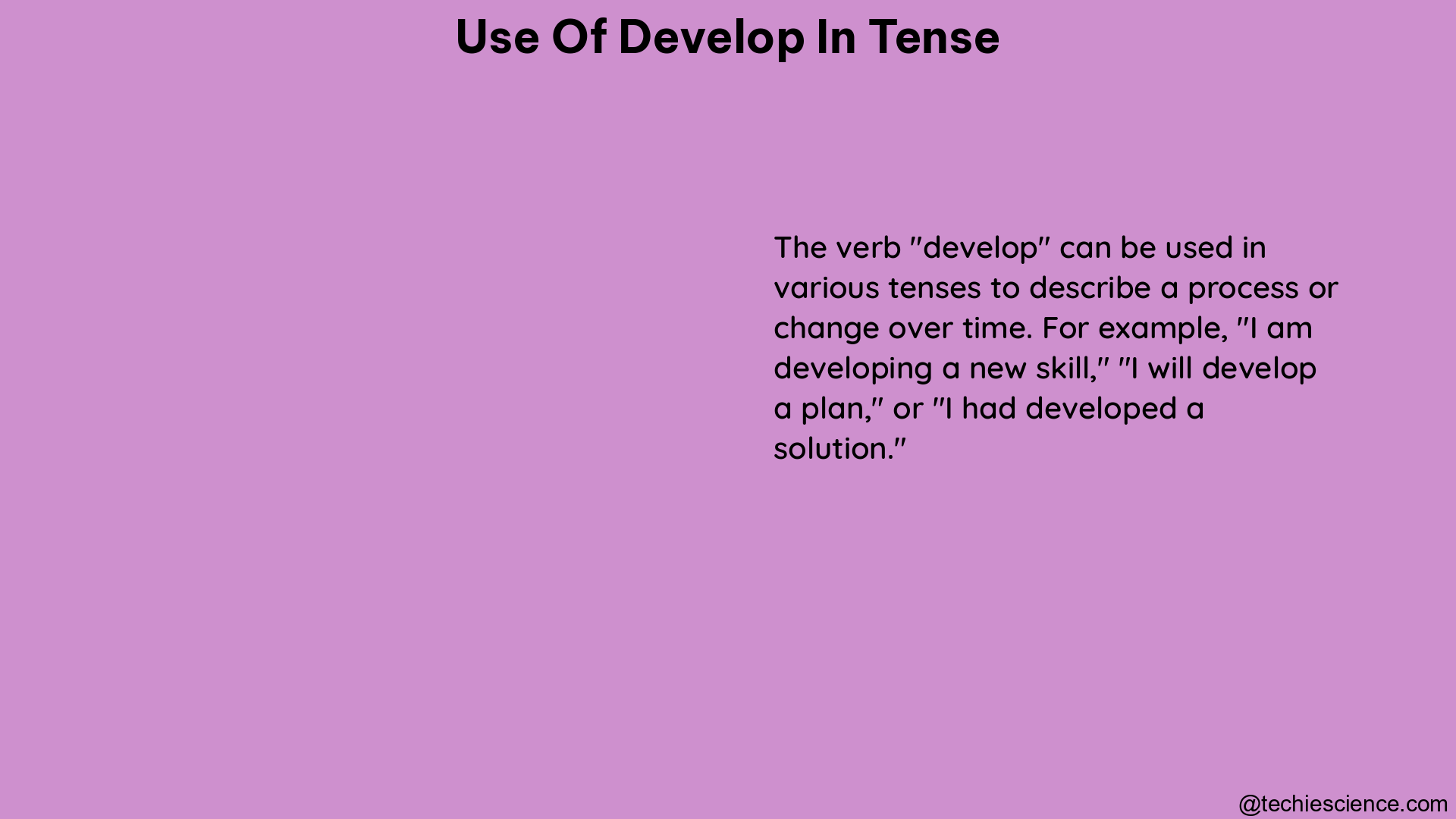The use of the verb “develop” is crucial in conveying the correct meaning and timeline of actions in English sentences. From describing ongoing processes to completed tasks, the various tenses of “develop” allow you to precisely communicate your ideas. In this comprehensive guide, we’ll explore the nuances of using “develop” across different tenses, providing you with a deep understanding and practical examples to enhance your English proficiency.
Present Tense
Simple Present
The simple present tense is used to describe general truths or ongoing actions.
– Example: “I develop new skills every year.” (General truth)
– Example: “She develops software for a living.” (Ongoing action)
Present Progressive/Continuous
The present progressive tense is used to describe actions in progress at the moment of speaking.
– Example: “I am developing a new project.” (Action in progress)
– Example: “They are developing a new product.” (Action in progress)
Past Tense

Past Simple
The past tense is used to describe completed actions.
– Example: “I developed a new skill last year.” (Completed action)
– Example: “They developed a new software.” (Completed action)
Past Progressive/Continuous
The past progressive tense is used to describe actions that were in progress at a specific point in the past.
– Example: “I was developing a new project last year.” (Action in progress at a specific point)
– Example: “They were developing a new product.” (Action in progress at a specific point)
Past Perfect Tense
Past Perfect Simple
The past perfect tense is used to describe actions completed before another action in the past.
– Example: “I had developed a new skill before I started the job.” (Action completed before another action)
– Example: “They had developed a new software before they launched it.” (Action completed before another action)
Past Perfect Progressive/Continuous
The past perfect progressive tense is used to describe actions that started before another action in the past and continued up to that point.
– Example: “I had been developing a new project for a year before I finished it.” (Action started before another action and continued)
– Example: “They had been developing a new product for months before they launched it.” (Action started before another action and continued)
Future Tense
Future Simple
The future tense is used to describe actions that will happen in the future.
– Example: “I will develop a new skill next year.” (Action that will happen)
– Example: “They will develop a new software.” (Action that will happen)
Future Progressive/Continuous
The future progressive tense is used to describe actions that will be in progress at a specific point in the future.
– Example: “I will be developing a new project next year.” (Action that will be in progress)
– Example: “They will be developing a new product.” (Action that will be in progress)
Future Perfect
The future perfect tense is used to describe actions that will be completed before another action in the future.
– Example: “I will have developed a new skill by next year.” (Action that will be completed)
– Example: “They will have developed a new software by then.” (Action that will be completed)
Future Perfect Progressive/Continuous
The future perfect progressive tense is used to describe actions that will start before another action in the future and continue up to that point.
– Example: “I will have been developing a new project for a year by next year.” (Action that will start before another action and continue)
– Example: “They will have been developing a new product for months by then.” (Action that will start before another action and continue)
Conditional Tense
Conditional Simple
The conditional tense is used to describe hypothetical or uncertain actions.
– Example: “I would develop a new skill if I had the time.” (Hypothetical action)
– Example: “They would develop a new software if they had the resources.” (Hypothetical action)
Conditional Progressive/Continuous
The conditional progressive tense is used to describe hypothetical or uncertain actions that would be in progress.
– Example: “I would be developing a new project if I had the opportunity.” (Hypothetical action in progress)
– Example: “They would be developing a new product if they had the funding.” (Hypothetical action in progress)
Conditional Perfect
The conditional perfect tense is used to describe hypothetical or uncertain actions that would be completed.
– Example: “I would have developed a new skill if I had the chance.” (Hypothetical action completed)
– Example: “They would have developed a new software if they had the support.” (Hypothetical action completed)
Conditional Perfect Progressive/Continuous
The conditional perfect progressive tense is used to describe hypothetical or uncertain actions that would start before another action and continue.
– Example: “I would have been developing a new project for a year if I had started earlier.” (Hypothetical action that would start before another action and continue)
– Example: “They would have been developing a new product for months if they had the resources.” (Hypothetical action that would start before another action and continue)
Imperative
The imperative tense is used to give commands or instructions.
– Example: “Develop a new skill.” (Command)
– Example: “Let’s develop a new project.” (Command)
Infinitive
The infinitive tense is used to describe actions in a general sense.
– Example: “To develop a new skill is important.” (General action)
– Example: “To develop a new software is their goal.” (General action)
Gerund
The gerund tense is used to describe actions as nouns.
– Example: “Developing a new skill is important.” (Action as a noun)
– Example: “Developing a new software is their goal.” (Action as a noun)
Participles
Present Participle
The present participle is used to describe ongoing actions.
– Example: “Developing a new skill is important.” (Ongoing action)
– Example: “Developing a new software is their goal.” (Ongoing action)
Past Participle
The past participle is used to describe completed actions.
– Example: “I have developed a new skill.” (Completed action)
– Example: “They have developed a new software.” (Completed action)
Examples of “Develop” in Different Tenses
- Present Simple: “I develop new skills every year.”
- Present Progressive: “I am developing a new project.”
- Past Simple: “I developed a new skill last year.”
- Past Progressive: “I was developing a new project last year.”
- Past Perfect: “I had developed a new skill before I started the job.”
- Past Perfect Progressive: “I had been developing a new project for a year before I finished it.”
- Future Simple: “I will develop a new skill next year.”
- Future Progressive: “I will be developing a new project next year.”
- Future Perfect: “I will have developed a new skill by next year.”
- Future Perfect Progressive: “I will have been developing a new project for a year by next year.”
- Conditional Simple: “I would develop a new skill if I had the time.”
- Conditional Progressive: “I would be developing a new project if I had the opportunity.”
- Conditional Perfect: “I would have developed a new skill if I had the chance.”
- Conditional Perfect Progressive: “I would have been developing a new project for a year if I had started earlier.”
Key Points to Remember
- Developed is the past tense of “to develop,” while developing is the present progressive.
- Being developed implies ongoing action, whereas developed implies completed action.
- Developing can be used as a gerund to describe actions as nouns.
References
- Bab.la. (n.d.). How to conjugate “to develop” in English? Retrieved from https://en.bab.la/conjugation/english/develop
- Collins Dictionary. (n.d.). DEVELOP conjugation table. Retrieved from https://www.collinsdictionary.com/us/conjugation/english/develop
- WordReference.com. (n.d.). Conjugation of develop. Retrieved from https://www.wordreference.com/conj/enverbs.aspx?v=develop
- Gymglish. (n.d.). Verb conjugation: Conjugate To develop in English. Retrieved from https://www.gymglish.com/en/conjugation/english/verb/to_develop
- English Language & Usage Stack Exchange. (2019, April 4). Developed or being developed, how different? Retrieved from https://ell.stackexchange.com/questions/203864/developed-or-being-developed-how-different

Hi, My name is Ammu Shaji. I hail from Kerala. I hold a post-graduate degree in English Language and Literature. I am an Academic writer by passion and profession.